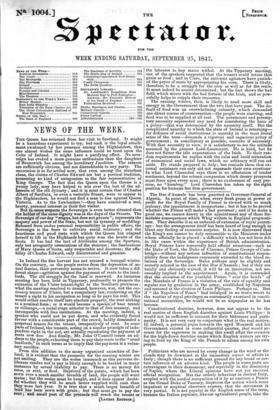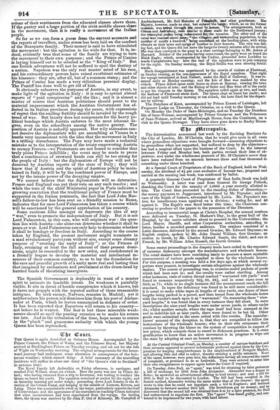Politicians who are moved by every change in the wind
or the clouds may be downcast at the immediate aspect of affairs in Italy; though there is no sufficient ground for any broad or cer- tain inference of an adverse kind. The people in some parts are extravagant in their demeanour, and especially in the dominions of Naples, where the Liberal opinions have not yet received official recognition. But the orderly behaviour in central Italy, coupled with the cordial recognition of it by so cautious a Prince as the Grand Duke of Tuscany, disproves the notion which some impatient or sceptical observers express, that the movement is very partial. It is not popular in the English sense of the term, because the Italian populace, like our agricultural people, take the
colour of their sentiments from the educated classes above them. If the gentry and a large portion of the civic middle classes share in the movement, then it is really a movement of the Italian people. So far as we conform a guests from the current accounts and the reports of travellers, undue stress has been laid en the conduct of the Bonaparte family. Their money is said to have stimulated the movement : but the agitation is too wide for that. It is, in- deed, evidently true that some of the family are trying to turn the movement to their own purposes ; and the Prince of Canino is laying himself out to be selected as the " King of Italy." But one foolish adventurer will not be suffered to spoil the destiny of a nation. Napoleon was the only real master mind of his race, and his extraordinary powers have raised exorbitant estimates of his kinsmen : they are, after all, but of a common stamp; and the Prince of Canino has made a very ridiculous personal display. The Pontiff has done well to get rid of him. It obviously subserves the purposes of Austria, in any event, to make light of the agitation in Italy : it is easy to spread abroad -reports of " paid conspiracies" and the like ; and it is almost a matter of course that Austrian politicians should point to the material improvement which the Austrian Government has ef- fected in its Italian provinces during the peace, with expressions of regret that the smiling fertility should be invaded by the rough tread of war. But luxury does not compensate for the heavy po- litical bondage which Austria enforces to the most irksome de- gree, even on the schoolboys among the native gentry. The position of Austria is nakedly apparent. Her wily statesmen can- not deceive the diplomatists who are assembling at Vienna in a bustle very inconsistent with the idea that the movement in Italy is a trifling disturbance. The Pope may have made a technical mistake as to the interpretation of the treaty empowering Austria to occupy Ferrara—we Protestants are not bound to consider that 'truly pious Prince infallible ; the event may be made to prove that a combination of crowned heads can still be too strong for the people of Italy : but the diplomatists of Europe will not be deceived by Austrian reports of the state of Italy ; they will know that if Austria and the spirit of Austrian policy be main- tained in Italy, it will be by the combined power of Europe, and not by the innate power of the decaying empire. We cannot beheve that the diplomatists will so determine. France and England can put their veto on any such resolve ; and while the tone of the chief Ministerial paper in Paris indicates a growing conviction that the traditional policy of France must be supported in the Italian peninsula, the fact that Lord John Rus- sell S father-in-law has been sent on a friendly mission to Rome, indicates that for once Lord Palmerston has taken a course which will be sanctioned by the general approbation of his country. - Some cautious folks amongst us deprecate the idea of any " war," even to promote the independence of Italy. But it is not Lord Palmerston, in this case, who will originate war : the ques- tion lies with Austria—she alone can determine whether it shall be peace or war. Lord Palmerston can only help to determine whether it shall be bondage or freedom in Italy. According to the course taken by England, the present movement might terminate in a mad revolutionary paroxysm without aim, except some dreamy purpose of "creating the unity of Italy " ; or the Princes of Italy, retaining at least the full amount of their present domi- nions, might be reconciled to the new order, and confederated in a friendly league to develop the material and intellectual re- sources of their common country, so as to lay the foundation for the sure and peaceful growth of a unity more real and lasting than that imagined by enthusiasts and proclaimed at the drum-head by hurried bands of theorizing insurgents.



























